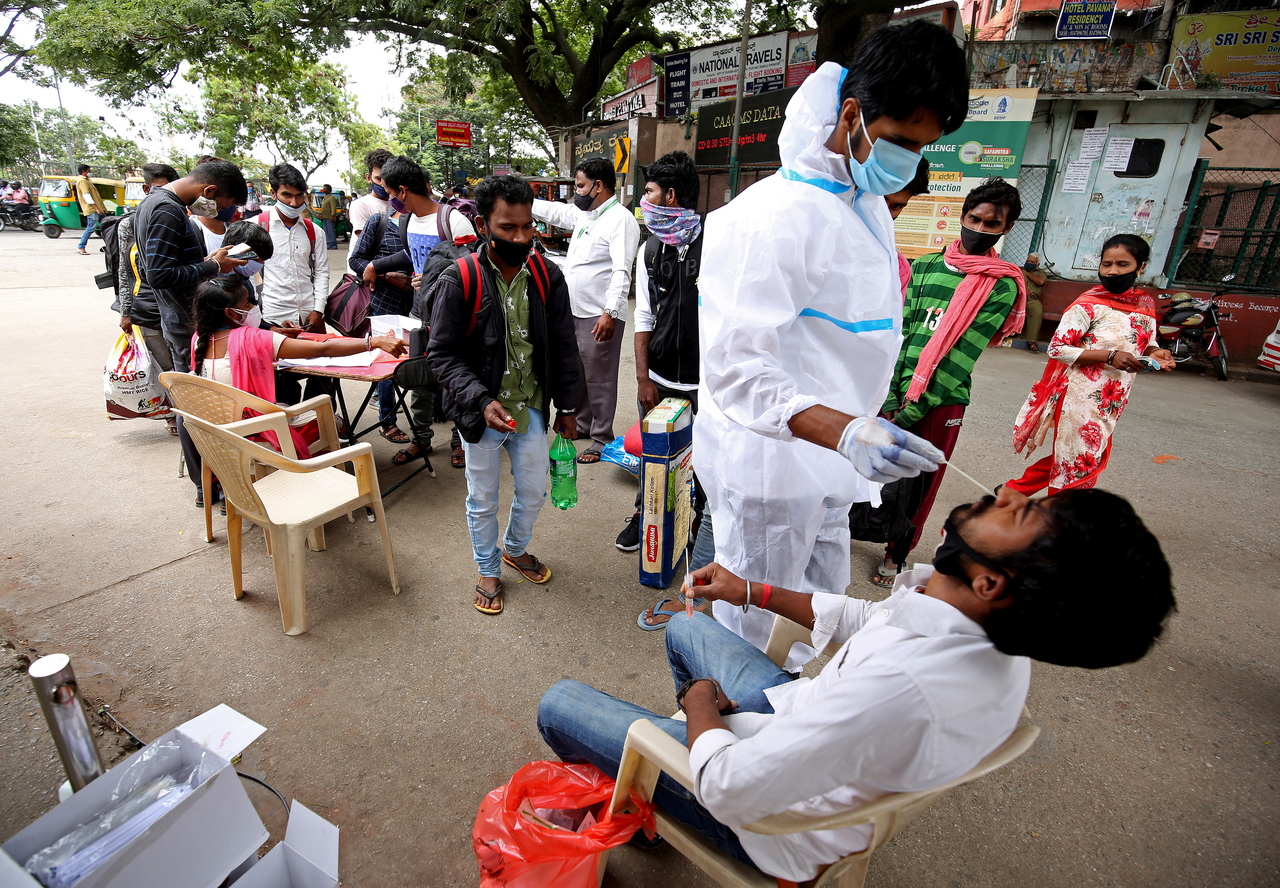Signs of a third Covid-19 wave in at least 10 Indian states
Sign up now: Get insights on Asia's fast-moving developments

A health worker takes a nasal swab sample of a man at the City Railway station in Bangalore, on Aug 2, 2021.
PHOTO: EPA-EFE
BANGALORE - Signs of a third Covid-19 wave have emerged in India, with at least ten states, including Tamil Nadu, Karnataka and Kerala in the south, reporting a rise in R-value, which means that each infected person is transmitting the coronavirus to many more people than in the past three months.
The R-value, or reproduction factor, is an important tool epidemiologists and policymakers use to check the prevalence and spread of Covid-19.
India's average R-value is 1.01 now. This means every infected person is transmitting the coronavirus to more than one other person.
When the country was gripped by a devastating second Covid-19 wave in May, the R-value was around 1.4, but this dropped to around 0.9 a month ago. The reproduction factor rising above one again is worrying health experts as it signals a growing infection rate.
The central state of Madhya Pradesh has the highest R-value of 1.31, followed by Himachal Pradesh (1.3) and the north-eastern state of Nagaland (1.09).
An R-value of 1.3 means 10 people with Covid-19 will infect 13 more people who in turn will infect another 16 or 17 people.
"The R-value going up could be early warning signals of the beginning of a third wave," said Dr Samiran Panda, head epidemiologist at the Indian Council of Medical Research (ICMR) in New Delhi, which is leading India's Covid-19 response.
But to understand the nature of the next wave, one must acknowledge the differences in the status of Covid-19 infections in every state, he added.
Nearly 80 per cent of the infections during the second wave came from ten states, including Maharashtra and Delhi.
Instead, those which recorded fewer infections and deaths in the second wave including Kerala, Tamil Nadu, Karnataka and Jammu and Kashmir are showing higher R-value.
Kerala, whose deft handling of the first and second waves received global praise including from the World Health Organisation (WHO), has an R-value of 1.06.
India has recorded 32 million cases of Covid-19 and 429,000 deaths till now.
Experts suggest that infections are rising due to fewer mobility restrictions, Covid-19 inappropriate behaviour such as not wearing masks, and the highly infectious Delta variant of the coronavirus, which is responsible for the majority of the cases now in India.
"Early restrictions successfully averted a second wave in some states, but the same states have vulnerable populations who are getting infected now when lockdowns are lifted and people are not observing safety precautions," said Dr Panda.

About two out of three Indians over the age of six have developed antibodies, according to the ICMR's community-based serosurvey published in July. That is up from roughly one in four people with antibodies in January. This still leaves 400 million Indians susceptible to infection.
Officials say they cannot declare a third wave until the number of infections is steadily increasing.
WHO chief scientist Soumya Swaminathan told news channel NDTV that the third wave "might not be as devastating as the second", because more people are now vaccinated and expanded Covid-19 medical facilities are still running in many states.
"Having said that, we should not become complacent as having a wave in a small town or rural area can also be as problematic as (the) last time, as those are the areas where we don't have the kind of health facilities that are needed to cope with the disaster. So, we need to work on strengthening facilities in those parts," Dr Swaminathan said.
Another bottleneck is the continuing shortage of vaccines as the two approved Indian manufacturers continue to miss production targets.
In a bid to fast-track emergency approvals for foreign-produced vaccines, Prime Minister Narendra Modi's government has exempted those on the WHO list from conducting bridging clinical trials in the country.
On Aug 7, Johnson & Johnson's single-dose viral vector vaccine became the fifth shot to be approved in India after Covishield, Covaxin, Sputnik V and Moderna. But supplies are still a long way off.
Many states say an acute shortage is hampering their ability to combat Covid-19.


